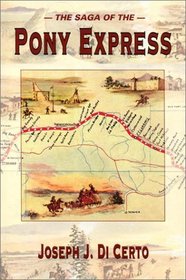This is a fascinating history of an American legend. Except for two chapters, the text just carried me along. The two chapters I found boring were descriptions of the home and rely stations and the terrain and distance between them, along the entire route. Not all that interesting to me, but obviously an important part of the Pony Express history.
The author also relates stories of the men who organized and worked for the Pony Express, including such notables as gunfighter Jack Slade and two young men---Jame Butler "Wild Bill" Hickok and William F. "Buffalo Bill" Cody.
My favorite story was of the Pony Express rider who, after being ambushed by Indians, tried to out run them, was surrounded and then fought it out with them, killing several Indians before being killed himself. The body of the rider, Billy Tate, was later found full of arrows. Billy was only fourteen years old.
Finally, the author presents data to show an interesting, possible conspiracy to destroy the Pony Express and a stage line which ran the "northern route," while funding another stage line which took the "southern route." This due to a "personal relationship" between the President of the United States and the stage line owner, plus southerners who wished to destroy lines of communication between the northern states and western territories in 1860-1861.
The author also relates stories of the men who organized and worked for the Pony Express, including such notables as gunfighter Jack Slade and two young men---Jame Butler "Wild Bill" Hickok and William F. "Buffalo Bill" Cody.
My favorite story was of the Pony Express rider who, after being ambushed by Indians, tried to out run them, was surrounded and then fought it out with them, killing several Indians before being killed himself. The body of the rider, Billy Tate, was later found full of arrows. Billy was only fourteen years old.
Finally, the author presents data to show an interesting, possible conspiracy to destroy the Pony Express and a stage line which ran the "northern route," while funding another stage line which took the "southern route." This due to a "personal relationship" between the President of the United States and the stage line owner, plus southerners who wished to destroy lines of communication between the northern states and western territories in 1860-1861.




